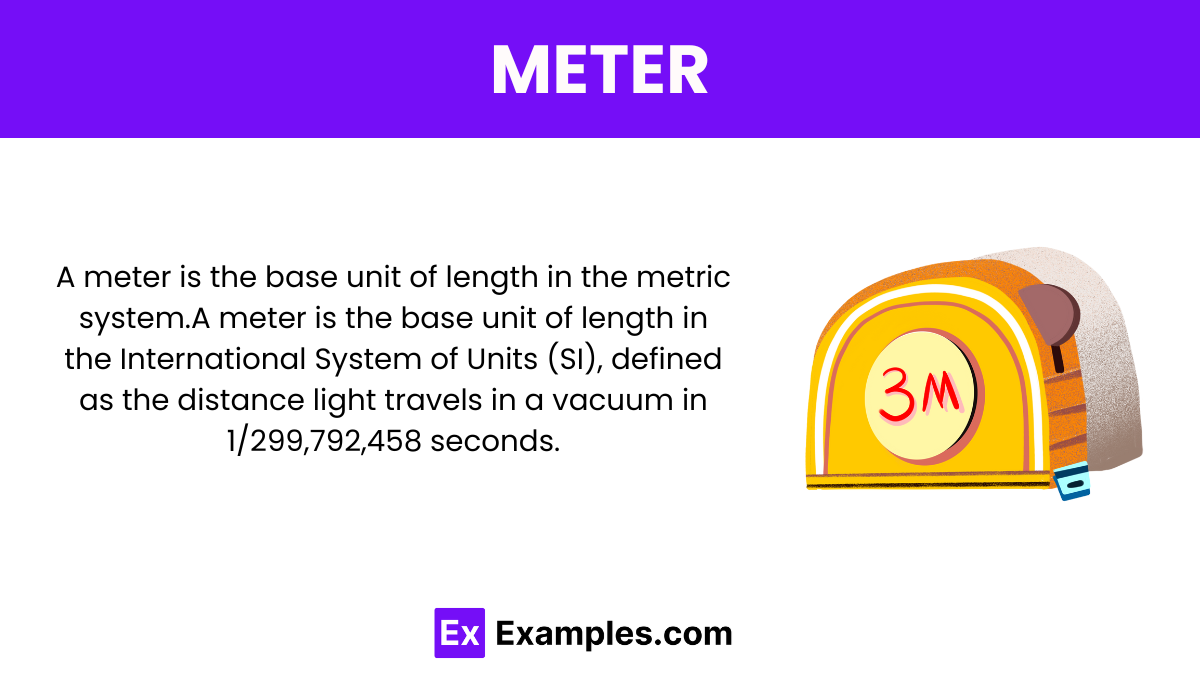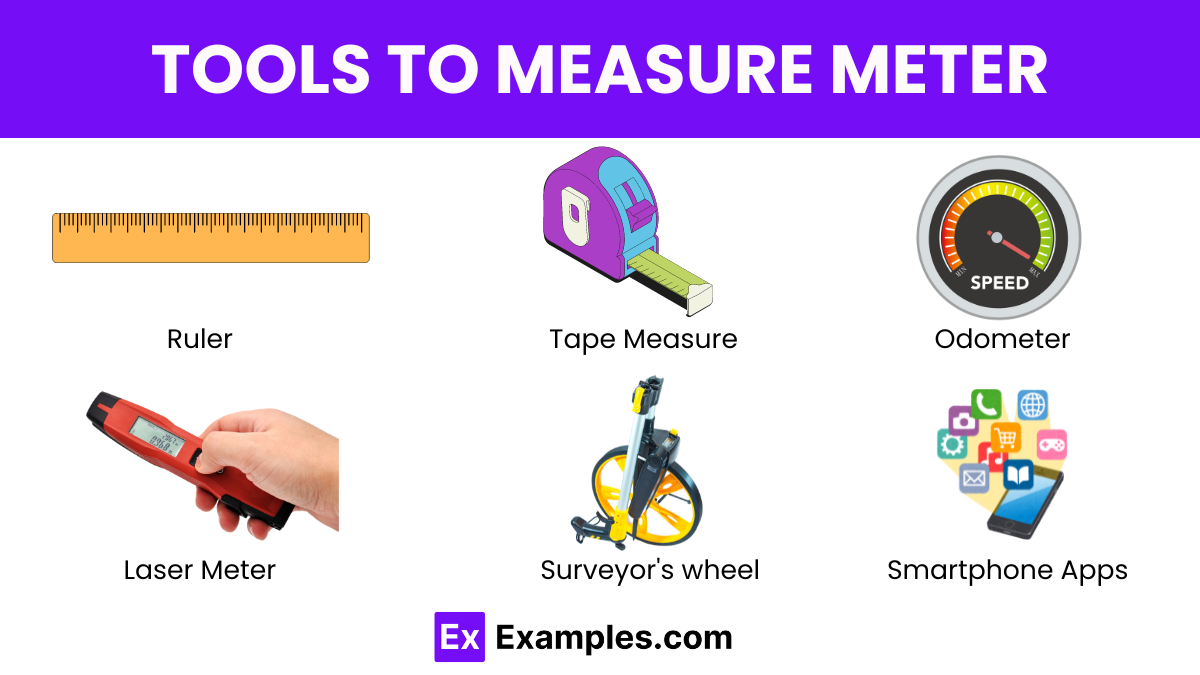What is the length of 1 meter in centimeters?
10 cm
100 cm
1000 cm
10000 cm

The term “Meter” is primarily associated with its use in the metric system of measurement. The meter is defined as the length of the path travelled by light in a vacuum during a time interval of 1/299,792,458 of a second. This definition relates to the fundamental constants of nature, making it highly precise for scientific as well as mathematical applications. The meter serves as a fundamental unit of length in the International System of Units (SI) and is widely used in various mathematical contexts where measurements and calculations involving distance are required.
The concept of the meter was first introduced during the French Revolution, with the aim of creating a uniform system of measurement. Initially, it was defined as one ten-millionth of the distance from the equator to the North Pole along a meridian through Paris. This measurement was intended to make the unit of length the same for everyone based on natural constants.

To measure a meter, several tools can be used depending on the required precision and context:

Here is a table that shows how meters can be converted to other common units of length:
| Conversion | Value |
|---|---|
| 1 meter | = 100 centimeters (cm) |
| 1 meter | = 1000 millimeters (mm) |
| 1 meter | = 0.001 kilometers (km) |
| 1 meter | = 39.37 inches (inches) |
| 1 meter | = 3.28 feet (feet) |
| 1 meter | = 1.09 yards (yards) |
This table provides conversion factors to translate measurements from meters into various other units of length. To convert meters to any of these units, you multiply or divide by the factor listed. For example, to find out how many inches are in a meter, you would multiply the number of meters by 39.37. Similarly, to convert meters to kilometers, you divide the number of meters by 1,000. This table is useful for various practical applications in science, engineering, and daily life where different units of measurement are commonly used.
Understanding how to convert meters to other units of length is important when dealing with various measurement systems. Whether you’re calculating distances, comparing lengths, or converting measurements for projects, knowing how to accurately convert between meters and other units ensures consistency. Here’s a straightforward guide to converting meters to and from other common units of length:
Here’s a table showing equivalent SI units to a meter, which is the base unit of length in the International System of Units (SI):
| SI Unit | Relationship to Meter | Description |
|---|---|---|
| Kilometer (km) | 1 km=1,000 m | Used for measuring longer distances like between cities. |
| Decimeter (dm) | 1 dm=0.1 m | Used commonly in everyday measurements. |
| Centimeter (cm) | 1 cm=0.01 m | Widely used in everyday objects and meteorology. |
| Millimeter (mm) | 1 mm=0.001 m | Common in engineering and technology for precise measurements. |
| Micrometer (μm) | 1 μm=1×10−6 m | Used in scientific and technological fields for microscopic distances. |
| Nanometer (nm) | 1 nm=1×10−9 m | Important in physics and chemistry, particularly nanotechnology. |
| Picometer (pm) | 1 pm=1×10−12 m | Utilized in atomic and molecular studies. |
| Femtometer (fm) | 1 fm=1×10−15 m | Relevant in particle physics, such as measuring nuclear sizes. |
| Multiples | Equivalent in Meters | Submultiples | Equivalent in Meters |
|---|---|---|---|
| Yottameter (Ym) | 1 Ym = 1,000,000,000,000,000,000,000,000 m | Decimeter (dm) | 1 dm = 0.1 m |
| Zettameter (Zm) | 1 Zm = 1,000,000,000,000,000,000,000 m | Centimeter (cm) | 1 cm = 0.01 m |
| Exameter (Em) | 1 Em = 1,000,000,000,000,000,000 m | Millimeter (mm) | 1 mm = 0.001 m |
| Petameter (Pm) | 1 Pm = 1,000,000,000,000,000 m | Micrometer (μm) | 1 μm = 0.000001 m |
| Terameter (Tm) | 1 Tm = 1,000,000,000,000 m | Nanometer (nm) | 1 nm = 0.000000001 m |
| Gigameter (Gm) | 1 Gm = 1,000,000,000 m | Picometer (pm) | 1 pm = 0.000000000001 m |
| Megameter (Mm) | 1 Mm = 1,000,000 m | Femtometer (fm) | 1 fm = 0.000000000000001 m |
| Kilometer (km) | 1 km = 1,000 m | Attometer (am) | 1 am = 0.000000000000000001 m |
| Hectometer (hm) | 1 hm = 100 m | Zeptometer (zm) | 1 zm = 0.000000000000000000001 m |
| Dekameter (dam) | 1 dam = 10 m | Yoctometer (ym) | 1 ym = 0.000000000000000000000001 m |

The meter, as the base unit of length in the International System of Units (SI), has extensive applications across various fields. Here are some of the primary uses of the meter:
One meter is equivalent to 100 centimeters. This conversion is used universally and is fundamental in various fields for measuring length and distances accurately.
The symbol for meter, the base unit of length in the International System of Units (SI), is “m”. This symbol is used universally in scientific and standard measurements
The unit of meters is the base unit of length in the International System of Units (SI), commonly used worldwide for measuring distances in various scientific and everyday contexts.
The meter symbol is “m,” representing the unit of length in the metric system. It is used to measure distance, size, or extent.
Text prompt
Add Tone
10 Examples of Public speaking
20 Examples of Gas lighting
What is the length of 1 meter in centimeters?
10 cm
100 cm
1000 cm
10000 cm
What is the length of 1 meter in millimeters?
10 mm
100 mm
1000 mm
10000 mm
How many meters are in 1 kilometer?
10
100
1000
10000
Convert 500 centimeters to meters.
0.5 meters
5 meters
50 meters
500 meters
Convert 2000 millimeters to meters.
0.2 meters
2 meters
20 meters
200 meters
How many meters are there in 3 kilometers?
30 meters
300 meters
3000 meters
30000 meters
Convert 1.5 meters to centimeters.
150 cm
15 cm
1500 cm
1.5 cm
Convert 2.75 meters to millimeters.
275 mm
2750 mm
27.5 mm
27500 mm
What is the conversion factor from meters to feet?
1 meter = 2.54 feet
1 meter = 3.28 feet
1 meter = 0.39 feet
1 meter = 1.09 feet
Convert 10 meters to inches.
25.4 inches
254 inches
328 inches
1000 inches
Before you leave, take our quick quiz to enhance your learning!

